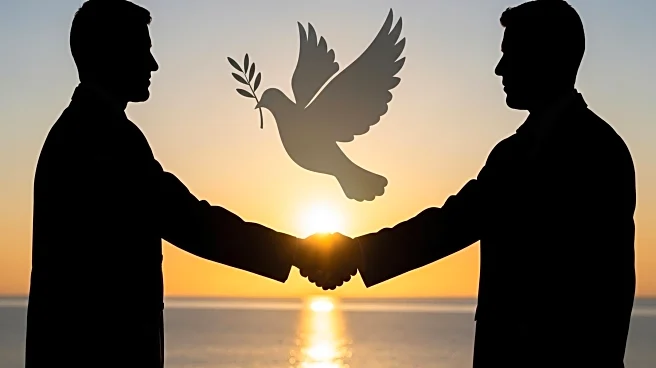What is the story about?
What's Happening?
World leaders convened in Sharm el-Sheikh, Egypt, to solidify a ceasefire between Israel and Hamas and initiate Gaza's reconstruction. The summit was co-chaired by U.S. President Donald Trump and Egyptian President Abdel Fattah el-Sisi, with participation from over 20 leaders, including French President Emmanuel Macron and U.N. Secretary-General António Guterres. The talks aimed to formalize the U.S.-brokered ceasefire deal that ended two years of conflict in Gaza, following Hamas's release of the last living Israeli hostages and Israel's release of thousands of Palestinian prisoners. The agreement outlines steps for Gaza's recovery and governance, with Israel expected to gradually withdraw from Gaza while international monitors oversee aid delivery and reconstruction.
Why It's Important?
The summit marks a significant diplomatic effort to stabilize the region after years of conflict. The ceasefire and subsequent reconstruction plan could lead to lasting peace and prosperity in the Middle East, as emphasized by President Trump. The release of hostages and prisoners is a critical step towards reconciliation, although challenges remain, such as recovering the bodies of hostages who died in captivity and determining Gaza's future administration. The involvement of international leaders and organizations underscores the global importance of resolving the conflict and rebuilding Gaza, potentially reducing regional tensions and fostering economic development.
What's Next?
The next phases of the plan involve Israel's gradual withdrawal from Gaza and the removal of Hamas from governing structures, along with dismantling its arsenal. International monitors will play a crucial role in overseeing these processes, ensuring compliance and facilitating aid delivery. The summit's outcomes may prompt further diplomatic engagements and negotiations to address unresolved issues, such as the governance of Gaza and the recovery of deceased hostages. Stakeholders, including political leaders and humanitarian organizations, are expected to continue their efforts to support Gaza's reconstruction and promote peace in the region.
Beyond the Headlines
The summit highlights the complex geopolitical dynamics in the Middle East, with various countries having vested interests in the region's stability. The exclusion of Israeli Prime Minister Benjamin Netanyahu due to diplomatic tensions illustrates the delicate nature of international relations. The reconstruction of Gaza presents ethical and logistical challenges, requiring careful coordination among international actors to ensure effective aid delivery and governance reform. Long-term peace in the region depends on addressing underlying issues, such as political representation and economic disparities, which could influence future diplomatic strategies.
















